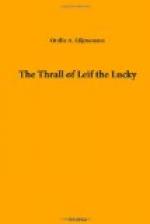“I did not know it was you, Rolf Erlingsson,” he hiccoughed over and over in maudlin terror. “I beg you not to be angry.”
“It is seldom that I have seen such a coward as that,” Alwin said in disgust as they walked on.
Rolf turned upon him his gentle smile. “It is your opinion, then, that a man must he a coward to fear me?”
Alwin did not answer immediately: of a sudden it occurred to him to doubt the Wrestler’s mild manner.
While he was still hesitating, Rolf caught him lightly around the waist and swung him over a hedge into a field where a dozen red-and-yellow tented booths were clustered. “These are Thorgrim Svensson’s tents,” he explained, following as coolly as though that were the accepted mode of entrance. “Yonder he is,—that lean little man with the freckled face. He is a great seafaring man. I promise you that you will see many precious things from all over the world.”
Approaching the booths, Alwin had immediate proof of this statement, for bench and bush and ground were littered with garments and furs and weapons, and odds-and-ends of spoil, as if a ship had been overturned on the spot. The lean little man whom Rolf had pointed out stood in the midst of it all, examining and directing. He was dressed in coarse homespun of the dingy colors of trading vessels, gray and brown and rusty black, which contrasted oddly with the mantle of gorgeous purple velvet he was at that moment trying on. His little freckled face was wrinkled into a hundred shrewd puckers, and his eyes were two twinkling pin-points of sharpness. He seemed to thrust their glance into Alwin, as he advanced to meet his visitors; and the men who were helping him paused and looked at the thrall with expectant grins.
Rolf said blandly, “Greeting, Thorgrim Svensson! We have come to see your horse-fight. This is Alwin, Edmund Jarl’s son, of England. Bad luck has made him Leif’s thrall, but his accomplishments have made me his friend.”
He spoke with the utmost mildness, merely glancing at the grinning crew; yet they sobered as though their mirth had been turned off by a faucet, and Thorgrim gave the thrall a civil welcome.
“It is a great pity,” he continued, addressing the Wrestler, “that you cannot see the Flesh-Tearer, since you came for that purpose; but it has happened that he has lamed himself, and will not be able to fight for a week. Do not go away on that account, however. My ship has brought me some cloaks even finer than the one you covet,”—here it seemed to Alwin as if the little man winked at Rolf,—“and if the Englishman is as good a swordsman as you have said—ahem!” He broke off with a cough, and endeavored to hide his abruptness by turning away and picking a fur mantle off a pile of costly things.
Alwin’s momentary surprise was forgotten at sight of the treasure thus disclosed. Beneath the cloak, thrown down like a thing of little value, lay an open book. It was written in Anglo-Saxon letters of gold and silver; its crumpled pages were of rarest rose-tinted vellum; its covers, sheets of polished wood gold-embossed and adorned with golden clasps. Even Alfred’s royal kinswoman had never owned so splendid a volume. The English boy caught it up with an exclamation of delight, and turned the pages hungrily, trying whether his mother’s lessons would come back to him.




